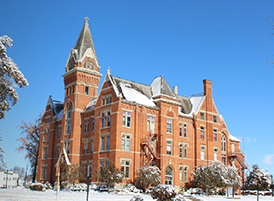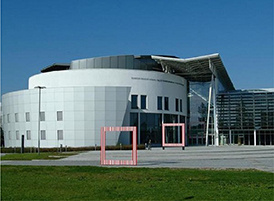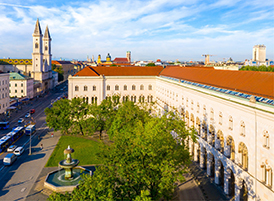Study MBBS in Germany
Study MBBS in Germany
Germany is frequently referred to as the Federal Republic of Germany by Germans. Germany is the most populated country in the EU and, after the US, the second most popular immigration destination worldwide. Berlin is the nation's capital. The other major cities include Frankfurt, Hannover, Bremen, Cologne, Munich, and Cologne. Germany is a great country for Indian students to reside because of its mild climate. Excessive heat in the summer and extreme cold in the winter are uncommon occurrences. A nice nation could be characterised as having a well-balanced environment based on the weather there. Germany is a country in Western Europe with a landscape that includes mountains, lakes, rivers, and the coast of the North Sea. Its establishment occurred more than two centuries ago. Berlin, the capital of this nation, has a thriving nightlife and a wide range of other attractions. Munich is home to numerous rehouses from the 16th century. The European Central Bank is situated in high-rise buildings in Frankfurt. Residents in the United States, Austria, Liechtenstein, portions of Switzerland, Luxembourg, and the remaining German populations in eastern Europe all call Germany home. The city is home to a multicultural working-class population from all over the world.
Request a Call Back
Why Study MBBS in Germany for Indian Students
Why Study MBBS in Germany for Indian Students
Germany is one of the most sought-after countries for MBBS aspirants. Germany has recently risen to the top of the list of popular educational destinations due to its cutting-edge infrastructure and excellent standard of instruction. A balanced curriculum, in keeping with the educational standards of Europe, offers students in Germany both academic knowledge and practical experience. Because of Germany's highly developed healthcare system, students can gain experience and work in hospitals both while they are still in school and after they have graduated. Currently, 6,000 graduates graduate each year, compared to about 10,000 students who enrol in college each year. The number of students from India studying at medical institutes in Germany is rising yearly due to the high quality of the education in medicine program they offer. Numerous medical schools in Germany provide free education to their international students, which is one of the reasons why Germany should be on your short list to study MBBS. One of the finest possibilities for Indian students is medical school in Germany because there are no additional tests necessary besides the Germany own country exam. Not required NEET exam. Indian students find it highly enticing to study in a country with such cutting-edge technology because their schooling is so high-tech. Students benefit from the fact that universities provide food and lodging because they do not have to search elsewhere for these necessities. Students can eat at vegetarian eateries and enjoy Indian cuisine.
| Basic Eligibility | 10+2 (PCB) with 70% |
|---|---|
| NEET Exam | Not Compulsory |
| IELTS | Not Required |
| MBBS Course Duration (In years) | 5+1 (1 year of Internship) |
| Total Course Fee | 15-17 lakhs (for 5years) |
| Medium of Education | German |
| Recognition of Universities | MCI & WHO accredited |
Application Process to study MBBS in Germany for Indian students:
Application Process to study MBBS in Germany for Indian students:
- Fill up the application form/ get it filled by our team.
- Submit copies of all your important original documents, like your Passport, by scanning them.
- Your documents assessment will get started.
- Start your German language prep of A1 and A2 with our team.
- Within eight working days, you will receive an admission letter straight from the medical university.
- After the immigration process has begun, your entry will be confirmed.
- Once you get the invitation letter, you will have to visit the German Embassy.
- Double-check and evaluate as well as to authenticate every document before applying for a Germany visa.
- After the visa process, departure will happen.
- After going to Germany candidates must have to give one exam in Germany to study medicine.
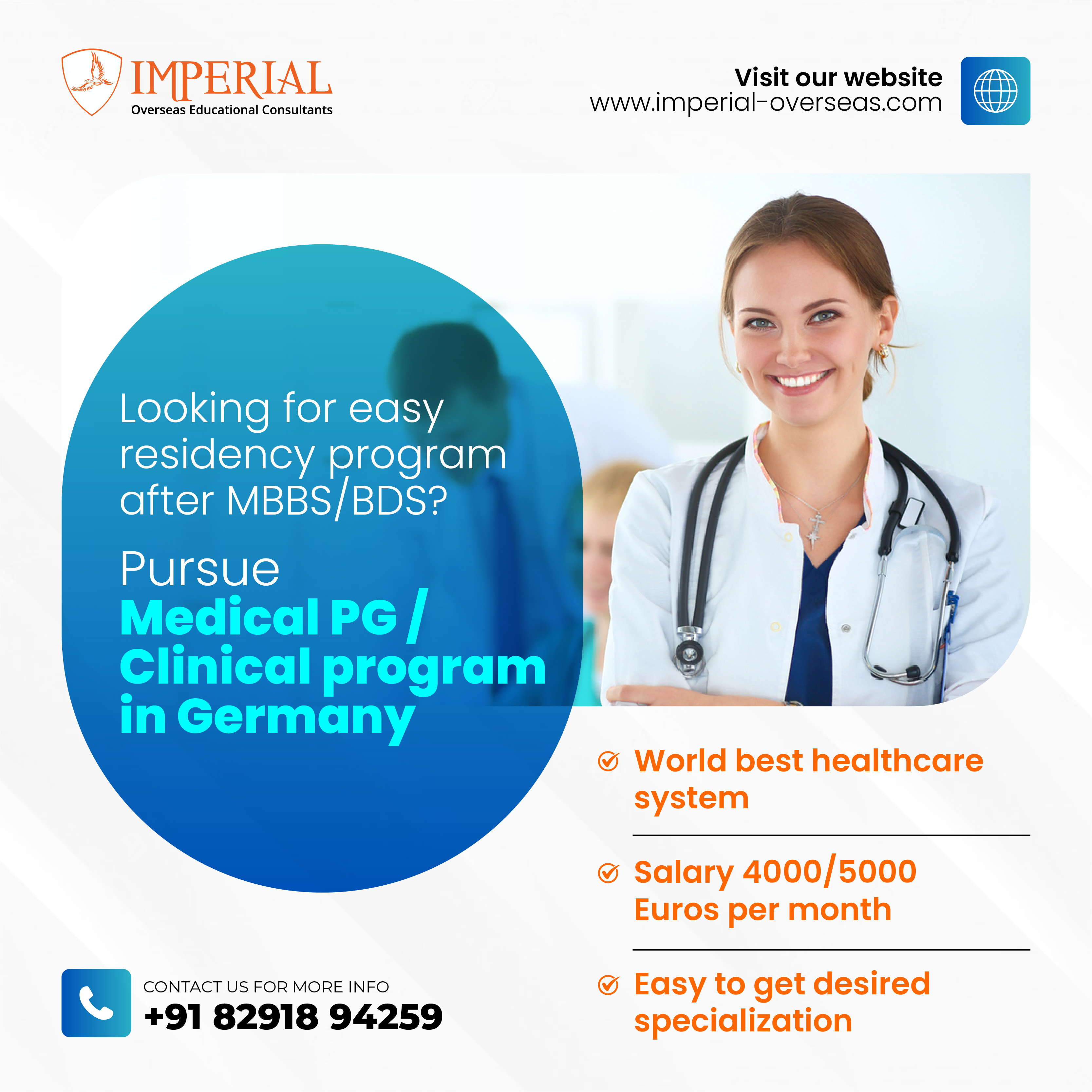
Required Documents for MBBS in Germany:
Required Documents for MBBS in Germany:
- Transcripts of previous academic studies
- Accredited evaluation of foreign transcripts
- Scores on relevant tests including NEET
- Passport copies in good standing
- Recommendation letters
- Statement of purpose
- Curriculum vitae
- Background check for criminal convictions of the applicant
- The student visa
- Copies of passport-size photographs
Eligibility Criteria to study MBBS in Germany for Indian students
Eligibility Criteria to study MBBS in Germany for Indian students
The next step is to carefully review the eligibility requirements provided by the institution and determine whether you fully qualify it after selecting a suitable medicine degree and university to study at in Germany. Along with this, the following are the important requirements and paperwork you must provide while applying to study MBBS in Germany:
- Academic Qualification:
It is crucial for international students to confirm that their academic credentials are accepted, accredited, and meet the requirements specified by German medical schools. Contact the university's admissions committee, the German Academic Exchange Service (DAAD), or the Standing Conference of Ministers to see if your academic credentials meet the necessary requirements. You can also check if your degrees satisfy the prerequisites by contacting the Standing Conference of Ministers. If your credentials are not accepted, your university may need you to complete a one-year prerequisite course before you may proceed to the Medicine degree programme. - German Language proficiency:
Since there are not many English-taught medical degrees available in the nation (and you will need to produce English proficiency test results), you might need to provide proof of your German language competency in order to be admitted to a German-taught programme. A C1 certificate is typically required, though this can vary from medical institution to medical university. If you are enrolling in a preparatory course, a B1 German Certificate is also necessary. - Certified Grade Certificate:
Due to the intense competition in the nation's medical schools, your grades and academic credentials will be vital in assisting you in gaining admission to the medicine course or MBBS degree of your choice. Your chances are somewhat better if you get higher grades in subjects like biology and chemistry that are connected to medicine. - Medical Entrance Exams:
To apply for a medicine programme, the institution will require you to submit the results of your medical entrance exams. For Indian students, the NEET UG exam scores are primarily required for admission to the MBBS programme in Germany.
MBBS in Germany: Course Details
MBBS in Germany: Course Details
Any reputable medical institute in Germany requires 6 to 7.5 years to complete a medical degree, including a 1- to 1.5-year internship. The applicant must have completed his or her 10+2 in Science (Biology) with a 60% grade point average and NEET exam is not mandatory to be considered for the course. The following steps are taken to complete a medical degree or MBBS in Germany:
- Stage 1: Pre-Clinical Phase of MBBS in Germany, which lasts for two years and is divided into four semesters. This is the initial phase, which covers the fundamentals of science and medicine. At the conclusion of this stage, an applicant must pass the initial medical licensure examination.
- Stage 2: Clinical Phase of the German MBBS Program: This phase lasts three years and consists of six semesters. This is the program's main phase, and it consists of basic courses that are taught through a variety of hands-on techniques. These techniques include lectures, hands-on training, seminars, and real-world internships.
- Stage 3: Practical Year of MBBS in Germany: This stage consists of a year of clinical training that will familiarise you with the application of the theoretical ideas you have previously learned. These include surgery, internal medicine, and an elective course. This crucial stage will give the applicant the chance to gain valuable on-the-job experience that will better him for the future.
- Stage 4: German MBBS State Examination Passing the State Examination, a nationally standardised test, is the final requirement for obtaining a medical degree in Germany. One can only apply for a medical licence in Germany and start working as a certified doctor after completing this exam.
Job and career opportunities after MBBS in Germany
Job and career opportunities after MBBS in Germany
Employers would be willing to hire you no matter where you are because of the excellent reputation that MBBS in Germany has around the world. Additionally, an MBBS will provide you with a wide range of abilities that will directly translate into a wide range of professional options. A functioning medical centre is another feature that practically all German medical institutes with MBBS programmes have. This facility gives students the chance to put their education into practice while also helping them learn through first-hand exposure.
Medical experts are in high demand, and their salaries vary according to their position and expertise, just like in any other field. A specialist in Germany makes an annual salary of about €80,000. Doctors with the highest salaries also include physicians. A doctor in Germany with some experience can anticipate earning more than €100,000 a year.
One of the most sought-after degrees is an MBBS because doctors are the most employable and have the highest pay packages worldwide, and Germany is no exception. In Germany, a medical degree assures you of both high employability and excellent pay. Beyond financial gain, completing an MBBS in Germany allows you to travel easily to other EU nations where you can freely practise medicine.
Advantage to study MBBS in Germany for Indian students:
Advantage to study MBBS in Germany for Indian students:
- Germany is very advanced in terms of its service sector.
- The MBBS curriculum includes access to top-notch technologies and classroom instruction.
- Students who earn an MBBS degree can work in the entire EU.
- Numerous graduates of prestigious German universities now work for internationally renowned medical councils in India.
- Students are housed in university residence halls and hostels.
- Additionally, students can get excellent rates on rental apartments if they like to do so.
- In order to prevent students from becoming lost on campus, maps and routes are constantly offered to them.
- Students can choose and choose their favourite foods because there are many different cuisine options in Germany.
- Attending school cultural events allows students to take a mental vacation from studying and keep their minds active.
- In a well-stocked library, university students have access to a large selection of books from practically every genre.
- Additionally, there are several libraries where students can study.
- When they employ student discounts, students can significantly reduce the cost of domestic travel.
- Numerous universities in Germany grant scholarships.
- There are numerous cafes and work areas where students can study and relax alone.
- Germany experiences a wide range of weather, most of which are pleasant.
- The Aachen Cathedral, Quedlinburg, Schwerin Castle, and other famous German sites are wonderful to visit during the holidays.
- After completing the school, a graduate can find employment at one of the nation's reputable hospitals.
- Students who want to make money while they study can find internships and part-time jobs.
- German degrees are highly valued in Europe due to the country's excellent educational system.
- German universities have highly tight hiring policies; thus, they only employ lecturers with extensive experience and a good academic background.
- Exchange programmes are available between respected colleges in Germany and other parts of the world.
OUR SERVICES
OUR SERVICES
FREE COUNSELLING to Study MBBS in Germany
We guide and design the best path with the right knowledge and insight for you for MBBS Abroad.
University Shortlisting FOR MBBS IN Germany
We help you to find the perfect and most suitable university for your career.
APPLICATION PROCESS FOR MBBS IN Germany
We apply your application directly to your selected university.
Admission and Documents Required for MBBS in Germany
We complete all your documentation processes.
Visa & TICKETS
Once your invitation arrives, we apply for your visa and tickets.
TRAVEL ASSISTANCE
From India to the University hostel, we all take care of your travel arrangements.
ACCOMMODATION
We provide government/ private hostels as per requirement.
LOCAL SUPPORT
We have our local representative for your support.
FOREX SUPPORT
We render most economical foreign exchange support from our tie-up forex company.
APPLICATION PROCESS to Study MBBS in Germany
APPLICATION PROCESS to Study MBBS in Germany
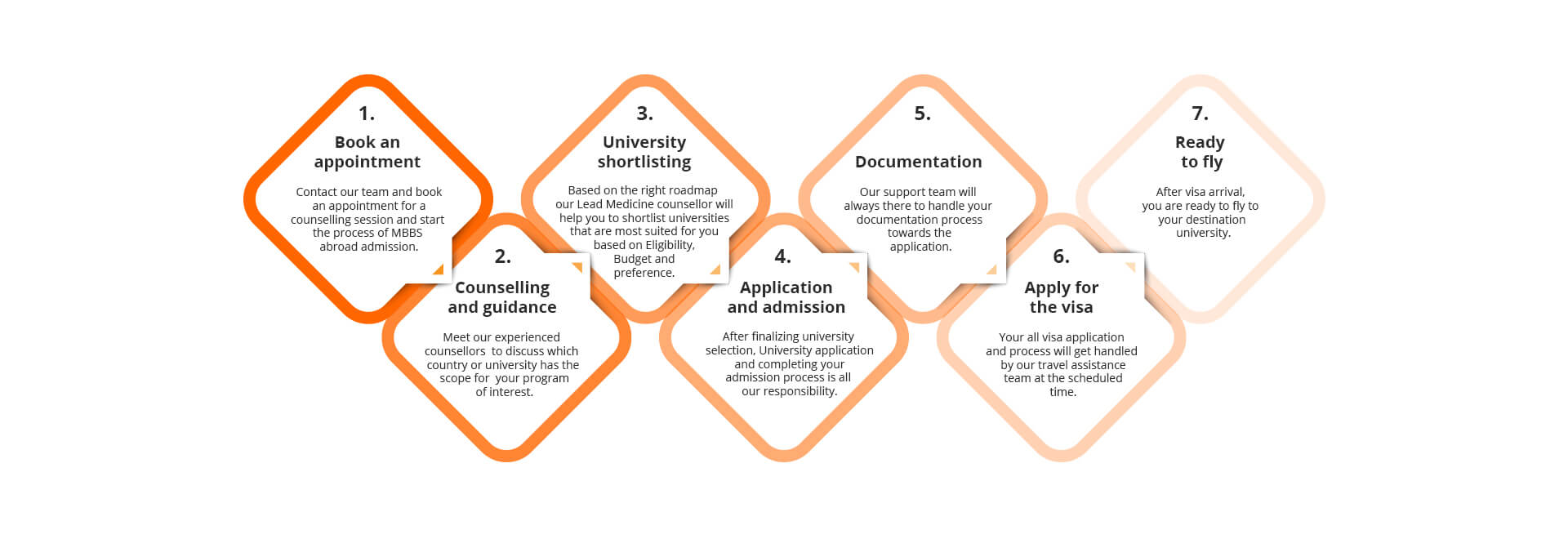
FAQ
FAQ
No. MBBS in Germany don’t required NEET exam.
